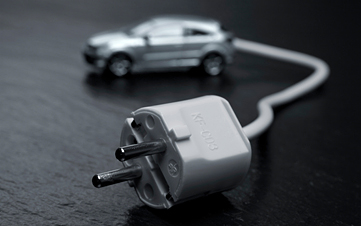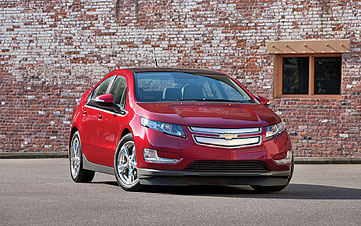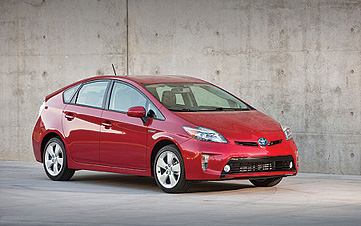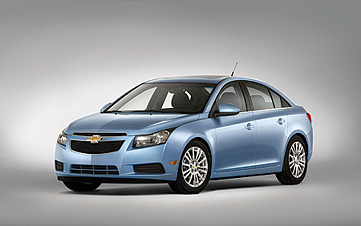What You Should Know About Green Cars
If fuel economy is high on your list of specs for your new car, a number of technologies can satisfy that need.


Profit and prosper with the best of Kiplinger's advice on investing, taxes, retirement, personal finance and much more. Delivered daily. Enter your email in the box and click Sign Me Up.
You are now subscribed
Your newsletter sign-up was successful
Want to add more newsletters?

Delivered daily
Kiplinger Today
Profit and prosper with the best of Kiplinger's advice on investing, taxes, retirement, personal finance and much more delivered daily. Smart money moves start here.

Sent five days a week
Kiplinger A Step Ahead
Get practical help to make better financial decisions in your everyday life, from spending to savings on top deals.

Delivered daily
Kiplinger Closing Bell
Get today's biggest financial and investing headlines delivered to your inbox every day the U.S. stock market is open.

Sent twice a week
Kiplinger Adviser Intel
Financial pros across the country share best practices and fresh tactics to preserve and grow your wealth.

Delivered weekly
Kiplinger Tax Tips
Trim your federal and state tax bills with practical tax-planning and tax-cutting strategies.

Sent twice a week
Kiplinger Retirement Tips
Your twice-a-week guide to planning and enjoying a financially secure and richly rewarding retirement

Sent bimonthly.
Kiplinger Adviser Angle
Insights for advisers, wealth managers and other financial professionals.

Sent twice a week
Kiplinger Investing Weekly
Your twice-a-week roundup of promising stocks, funds, companies and industries you should consider, ones you should avoid, and why.

Sent weekly for six weeks
Kiplinger Invest for Retirement
Your step-by-step six-part series on how to invest for retirement, from devising a successful strategy to exactly which investments to choose.
If fuel economy is high on your list of specs for your new car, a number of technologies can satisfy that need. Which is best for you depends on your other goals.
For example, do you want to be as green as possible? An electric vehicle (EV) is the answer. Want superb fuel economy without worrying about plugging in? A hybrid is a good choice. Do you crave power and the feel of gears shifting as you accelerate? If so, hybrids and EVs are likely out of contention, but diesels and turbocharged gas engines are good candidates.
Check out the green options and the pros and cons of each featured in this slide show. To compare ownership costs for traditional versus green cars, use our Green Car Calculator.
To compute annual fuel costs for plug-in vehicles for our rankings, we assumed 15,000 miles of city and highway driving a year, evenly spread out over five days a week with a two-week vacation.

Electrics, such as the Nissan Leaf
- How it works: A battery-powered electric motor runs all the car's systems. Charge the battery at home and you have about 100 miles to go before you need to recharge.
- Why it's cool: Zero tailpipe emissions, plus pickup
- Trade-offs: Limited range; few public charging stations
Nissan Leaf SV
- Sticker price: $36,050*
- Invoice price: $34,557
- Annual fuel cost#: $612 (electricity costs)
- Other popular models: Mitsubishi iMiev, Smart electric drive
*Qualifies for $7,500 federal tax credit. #Based on 15,000 miles of city and highway driving per year.

Plug-in Hybrids, such as the Chevrolet Volt
- How it works: A battery-powered electric motor you can plug in at home operates for a limited number of miles. After the battery is depleted, a gas engine kicks in.†
- Why it's cool: EV range, but without "range anxiety"
- Trade-offs: High price premium; often underpowered
Chevrolet Volt
- Sticker price: $39,995*
- Invoice price: $38,429
- Annual fuel cost#: $1,000**
- Other popular models: Toyota Prius Plug-in
*Qualifies for $7,500 federal tax credit. †The Volt’s gas engine acts as a generator to power the electric motor. Other plug-ins revert to hybrid mode after the battery is depleted. #Based on 15,000 miles of city and highway driving per year. **Fuel-efficiency depends on how often you charge.

Hybrids, such as the Toyota Prius
- How it works: The battery-powered electric motor assists the engine and can recapture energy from braking. The engine shuts down when you stop, saving fuel.
- Why it's cool: Eco-friendly without high price of a plug-in
- Trade-offs: Often underpowered; battery reduces cargo area
Toyota Prius II
- Sticker price: $24,760
- Invoice price: NA
- Annual fuel cost#: $968
- Other popular models: Ford Fusion, Honda Civic, Lexus RX
#Based on 15,000 miles of city and highway driving per year.

Diesels, such as the Volkswagen Jetta TDI
- How it works: Small but powerful engines plus diesel fuel’s high energy content make these vehicles up to 35% more efficient than comparable gas-powered vehicles.
- Why it's cool: Powerful, yet fuel-thrifty
- Trade-offs: Diesel fuel costs more than gasoline
Volkswagen Jetta TDI
- Sticker price: $23,545
- Invoice price: $22,634
- Annual fuel cost#: $1,721
- Other popular models: Audi A3, Mercedes E350 BlueTec
#Based on 15,000 miles of city and highway driving per year.

Turbocharged gas engines, such as the Chevrolet Cruze Eco
- How it works: The exhaust from the engine powers a fan, which forces more air into the engine’s cylinders. This generates extra power, so smaller engines can be used.
- Why it's cool: Cheapest way to go green
- Trade-offs: Good but not stellar fuel economy
Chevrolet Cruze Eco
- Sticker price: $19,995
- Invoice price: $19,225
- Annual fuel cost#: $1,457
- Other popular models: Kia Optima 2.0T, Nissan Juke
#Based on 15,000 miles of city and highway driving per year.

Profit and prosper with the best of Kiplinger's advice on investing, taxes, retirement, personal finance and much more. Delivered daily. Enter your email in the box and click Sign Me Up.

-
 Dow Adds 1,206 Points to Top 50,000: Stock Market Today
Dow Adds 1,206 Points to Top 50,000: Stock Market TodayThe S&P 500 and Nasdaq also had strong finishes to a volatile week, with beaten-down tech stocks outperforming.
-
 Ask the Tax Editor: Federal Income Tax Deductions
Ask the Tax Editor: Federal Income Tax DeductionsAsk the Editor In this week's Ask the Editor Q&A, Joy Taylor answers questions on federal income tax deductions
-
 States With No-Fault Car Insurance Laws (and How No-Fault Car Insurance Works)
States With No-Fault Car Insurance Laws (and How No-Fault Car Insurance Works)A breakdown of the confusing rules around no-fault car insurance in every state where it exists.
-
 10 Things You Should Know About Buying a Car Today, Even if You've Bought Before
10 Things You Should Know About Buying a Car Today, Even if You've Bought BeforeIf buying a car is on your to-do list, and it's been a while since you went shopping for a new one, this guide will help avoid any nasty shocks in the showroom.
-
 Get the Best Car Deal in Retirement: Here's the Trick
Get the Best Car Deal in Retirement: Here's the TrickPlanning on shopping for a new car this Labor Day weekend? Here’s how to haggle for a better price, even though you're retired.
-
 What to Do With Your Tax Refund: 6 Ways to Bring Growth
What to Do With Your Tax Refund: 6 Ways to Bring GrowthUse your 2024 tax refund to boost short-term or long-term financial goals by putting it in one of these six places.
-
 What Does Medicare Not Cover? Eight Things You Should Know
What Does Medicare Not Cover? Eight Things You Should KnowMedicare Part A and Part B leave gaps in your healthcare coverage. But Medicare Advantage has problems, too.
-
 15 Reasons You'll Regret an RV in Retirement
15 Reasons You'll Regret an RV in RetirementMaking Your Money Last Here's why you might regret an RV in retirement. RV-savvy retirees talk about the downsides of spending retirement in a motorhome, travel trailer, fifth wheel, or other recreational vehicle.
-
 The Six Best Places to Retire in New England
The Six Best Places to Retire in New Englandplaces to live Thinking about a move to New England for retirement? Here are the best places to land for quality of life, affordability and other criteria.
-
 The 10 Cheapest Countries to Visit
The 10 Cheapest Countries to VisitWe find the 10 cheapest countries to visit around the world. Forget inflation and set your sights on your next vacation.
-
 15 Ways to Prepare Your Home for Winter
15 Ways to Prepare Your Home for Winterhome There are many ways to prepare your home for winter, which will help keep you safe and warm and save on housing and utility costs.
